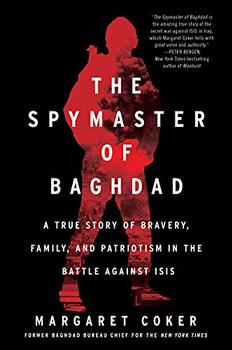Summary | Excerpt | Reading Guide | Reviews | Beyond the Book | Readalikes | Genres & Themes | Author Bio

A True Story of Bravery, Family, and Patriotism in the Battle against ISIS
by Margaret Coker
Because he was too poor to own a watch, Harith was spared the torture of counting down the minutes until the noon call to prayer, when the market closed. Before the stall owners would head to the mosque, Harith would take his daily wages from them and buy food to take home to his family, drums of vegetable oil, and burlap bags of dried chickpeas and bulghur. He would hitch a ride back to Saddam City, and, after dropping off his bags, he would walk to school.
After a month of this backbreaking labor, Harith's cousin surprised him. He had saved enough money for a pushcart with which the two teens could double the amount of cargo they were able to haul and thus double their wages. Their initiative became fodder for jokes among the traders. Harith became known as a guy who could sell dates to a date farmer, or a rug to a carpet merchant. Soon, the two had enough cash to go into the arbitrage business, buying bulk goods at wholesale prices and reselling them to retailers around Saddam City. Without really planning it, Harith was making a relative fortune. He was bringing home around $15 a day, a much better salary than his father ever had.
Early one morning, while he was getting dressed for work, he heard his mother tell her visiting sister how proud she was of him. Traders sought him out because he had a knack for deals. At home the family relied on him for clothing and food. As he crossed the bridge that separated Saddam City from Baghdad that morning, Harith walked taller in the wake of the rare approbation. On the way home, he didn't entertain his usual complaints of aching feet. But his mood soured when he saw his father in the courtyard, broomstick in hand. Somehow he had heard that Harith had done poorly on his last school exam.
You are nothing but a glorified donkey, Abu Harith told his son. Unless you graduate from university you will never be better than a beast. The words stung more than the beating.
On a bitter winter morning in February 1999, Harith walked to school for his university entrance exams. Heavy rains had flooded the streets and his shoes were soon coated with sucking, thick mud, their weight a constant reminder of the burden of his father's expectations. He walked the long way, bypassing the road on which the haunted house was located. He didn't want to tempt fate and attract bad luck.
Later that spring, when exam scores were published, Harith received the best marks in all Saddam City, results that guaranteed him acceptance to college. That day, Abu Harith received a nonstop flow of guests congratulating him on his son's achievement. The idea of praising Harith or giving him a gift for his success never crossed Abu Harith's mind.
In 2002, Iraq found itself wedged between the tectonic plates of history. The Americans were again determined to launch a war, and Saddam Hussein was not fit to prevent the catastrophe. The al-Sudani family was barely aware of the geopolitics consuming much of the world—they were waging their own epic battle.
The showdown had been building since Harith started attending classes at Baghdad University. Each morning, as always, he woke up at sunrise. He washed his face with a trickle of tepid water from the family's single bathroom, just off the kitchen. He ripped through the hot flatbread that his mother had placed on the tin serving tray, drank two small glasses of sweet, deeply brewed tea, and then boarded the minibus for the twenty-minute trip downtown, past the leafy boulevards of Karada to the green expanses of the Baghdad University.
Through the soaring concrete campus gates, Harith felt he had walked a flower-lined portal into another land, a place where people looked and spoke like him but lived a substantially better life. Sewage didn't run through their streets. Electricity didn't flicker off in their classrooms. Sidewalks were free of flat tires and rusty construction waste. Students expected life to offer them more than beatings, unlike in Saddam City. For the first time in his life, Harith had access to knowledge, music, alcohol, and girls. But not necessarily in that order.
Excerpted from The Spymaster of Baghdad by Margaret Coker. Copyright © 2021 by Margaret Coker. Excerpted by permission of Dey Street Books. All rights reserved. No part of this excerpt may be reproduced or reprinted without permission in writing from the publisher.
Your guide toexceptional books
BookBrowse seeks out and recommends the best in contemporary fiction and nonfiction—books that not only engage and entertain but also deepen our understanding of ourselves and the world around us.